| Listing 1 - 10 of 101 | << page >> |
Sort by
|
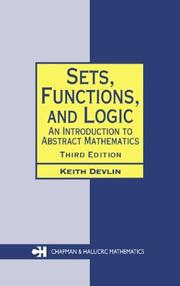
ISBN: 1584884495 Year: 2004 Publisher: London : Chapman and Hall,
Abstract | Keywords | Export | Availability | Bookmark
 Loading...
Loading...Choose an application
- Reference Manager
- EndNote
- RefWorks (Direct export to RefWorks)
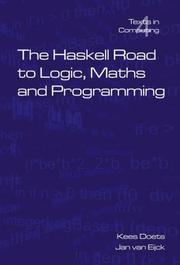
ISBN: 0954300696 Year: 2004 Publisher: London King's College
Abstract | Keywords | Export | Availability | Bookmark
 Loading...
Loading...Choose an application
- Reference Manager
- EndNote
- RefWorks (Direct export to RefWorks)
Book
Abstract | Keywords | Export | Availability | Bookmark
 Loading...
Loading...Choose an application
- Reference Manager
- EndNote
- RefWorks (Direct export to RefWorks)
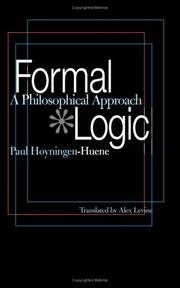
ISBN: 082297259X 0822958473 9780822958475 9780822972594 Year: 2004 Publisher: Pittsburgh, Pennsylvania : University of Pittsburgh Press,
Abstract | Keywords | Export | Availability | Bookmark
 Loading...
Loading...Choose an application
- Reference Manager
- EndNote
- RefWorks (Direct export to RefWorks)
Many texts on logic are written with a mathematical emphasis, and focus primarily on the development of a formal apparatus and associated techniques. In other, more philosophical texts, the topic is often presented as an indulgent collection of musings on issues for which technical solutions have long since been devised. What has been missing until now is an attempt to unite the motives underlying both approaches. Paul Hoyningen-Huene's Formal Logic seeks to find a balance between the necessity of formal considerations and the importance of full reflection and explanation about the seemingly arbitrary steps that occasionally confound even the most serious student of logic. Alex Levine's artful translation conveys both the content and style of the German edition. Filled with examples, exercises, and a straightforward look at some of the most common problems in teaching the subject, this work is eminently suitable for the classroom.
Logic, Symbolic and mathematical --- Algebra of logic --- Logic, Universal --- Mathematical logic --- Symbolic and mathematical logic --- Symbolic logic --- Mathematics --- Algebra, Abstract --- Metamathematics --- Set theory --- Syllogism
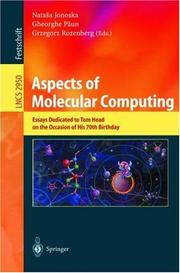
ISBN: 3540207813 9786610306664 1280306661 3540246355 9783540207818 Year: 2004 Volume: 2950 Publisher: Berlin, Heidelberg : Springer Berlin Heidelberg : Imprint: Springer,
Abstract | Keywords | Export | Availability | Bookmark
 Loading...
Loading...Choose an application
- Reference Manager
- EndNote
- RefWorks (Direct export to RefWorks)
Molecular computing is a rapidly growing subarea of natural computing. On the one hand, molecular computing is concerned with the use of bio-molecules for the purpose of actual computations while, on the other hand, it attempts to understand the computational nature of molecular processes going on in living cells. The book presents a unique and authorative state-of-the-art survey on current research in molecular computing: 30 papers by leading researchers in the area are drawn together on the occasion of the 70th birthday of Tom Head, a pioneer in molecular computing. Among the topics addressed are molecular tiling, DNA self-assembly, splicing systems, DNA-based cryptography, DNA word design, gene assembly, and membrane computing.
Molecular computers --- Molecular computers. --- Basic Sciences. Mathematics --- Mathematical Models, Simulation Models. --- DNA-based computers --- DNA computers --- Mathematics. --- Computer science. --- Mathematical logic. --- Mathematical Logic and Foundations. --- Computer Science, general. --- Algebra of logic --- Logic, Universal --- Mathematical logic --- Symbolic and mathematical logic --- Symbolic logic --- Mathematics --- Algebra, Abstract --- Metamathematics --- Set theory --- Syllogism --- Informatics --- Science --- Math --- Biocomputers --- Natural computation --- Logic, Symbolic and mathematical.
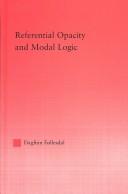
ISBN: 1135949352 1135949360 1280239646 9786610239641 0203337298 9780203337295 9780415938518 0415938511 0415938511 9781135949310 9781135949358 9781135949365 9780415998444 Year: 2004 Publisher: New York : Routledge,
Abstract | Keywords | Export | Availability | Bookmark
 Loading...
Loading...Choose an application
- Reference Manager
- EndNote
- RefWorks (Direct export to RefWorks)
This landmark dissertation (1961) provides a systematic introduction to systems of modal logic and stands as the first presentation of what have become central ideas in philosophy of language and metaphysics, from the 'new theory of reference' and non-linguistic necessity and essentialism to 'Kripke semantics'.
Modality (Logic) --- Modal logic --- Logic --- Nonclassical mathematical logic --- Bisimulation --- Modality (Logic). --- Modalité (logique)
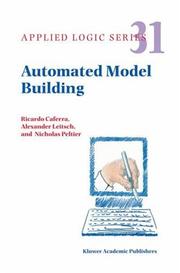
ISBN: 1402026528 9781402026522 1402026536 9781402026539 9789048166961 Year: 2004 Publisher: Dordrecht London Kluwer Academic
Abstract | Keywords | Export | Availability | Bookmark
 Loading...
Loading...Choose an application
- Reference Manager
- EndNote
- RefWorks (Direct export to RefWorks)
On the history of the book: In the early 1990s several new methods and perspectives in au- mated deduction emerged. We just mention the superposition calculus, meta-term inference and schematization, deductive decision procedures, and automated model building. It was this last ?eld which brought the authors of this book together. In 1994 they met at the Conference on Automated Deduction (CADE-12) in Nancy and agreed upon the general point of view, that semantics and, in particular, construction of models should play a central role in the ?eld of automated deduction. In the following years the deduction groups of the laboratory LEIBNIZ at IMAG Grenoble and the University of Technology in Vienna organized several bilateral projects promoting this topic. This book emerged as a main result of this cooperation. The authors are aware of the fact, that the book does not cover all relevant methods of automated model building (also called model construction or model generation); instead the book focuses on deduction-based symbolic methods for the construction of Herbrand models developed in the last 12 years. Other methods of automated model building, in particular also ?nite model building, are mainly treated in the ?nal chapter; this chapter is less formal and detailed but gives a broader view on the topic and a comparison of di?erent approaches. Howtoreadthisbook: In the introduction we give an overview of automated deduction in a historical context, taking into account its relationship with the human views on formal and informal proofs.
Automatic theorem proving --- Applied logic --- Automated theorem proving --- Theorem proving, Automated --- Theorem proving, Automatic --- Artificial intelligence --- Proof theory --- Logic. --- Mathematical logic. --- Mathematical Logic and Foundations. --- Algebra of logic --- Logic, Universal --- Mathematical logic --- Symbolic and mathematical logic --- Symbolic logic --- Mathematics --- Algebra, Abstract --- Metamathematics --- Set theory --- Syllogism --- Argumentation --- Deduction (Logic) --- Deductive logic --- Dialectic (Logic) --- Logic, Deductive --- Intellect --- Philosophy --- Psychology --- Science --- Reasoning --- Thought and thinking --- Methodology
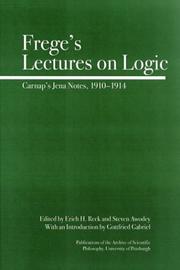
ISBN: 0812695534 9780812695533 0812695461 9780812695465 Year: 2004 Publisher: Chicago (Ill.): Open Court
Abstract | Keywords | Export | Availability | Bookmark
 Loading...
Loading...Choose an application
- Reference Manager
- EndNote
- RefWorks (Direct export to RefWorks)
"Gottlob Frege's (1848-1925) pioneering work in logic and the foundations of mathematics began with his Begriffsschrift (or concept-script) which played an early, influential role in the development of logic and analytic philosophy. One important philosopher who studied Frege's ideas was Rudolf Carnap (1891-1970), who attended Frege's classes on Begriffsschrift at the University of Jena. Discovered in the 1990s and presented here for the first time, Carnap's notes from these classes offer new information about Frege's teaching and his post-1903 views on logic after learning of Bertrand Russell's famous antinomy." "By looking at Frege's lectures on logic through the eyes of the young Carnap, this book casts new light on the history of logic and analytic philosophy. As two introductory essays by Gottfried Gabriel and by Erich H. Reck and Steve Awodey explain, Carnap's notes allow us to better understand Frege's deep influence on Carnap and analytic philosophy, as well as the broader philosophical matrix from which both continental and analytic styles of thought emerged in the 20th century."--Jacket.
Logic, Symbolic and mathematical --- Algebra of logic --- Logic, Universal --- Mathematical logic --- Symbolic and mathematical logic --- Symbolic logic --- Logic, Symbolic and mathematical. --- Logik. --- Mathematische Logik. --- Frege, Gottlob, --- Frege, Gottlob. --- Geschichte 1910-1914. --- Mathematics --- Algebra, Abstract --- Metamathematics --- Set theory --- Syllogism
Book
ISBN: 1282607936 9786612607936 1400826187 9781400826186 9781282607934 Year: 2004 Publisher: Princeton, N.J. ; Oxford : Princeton University Press,
Abstract | Keywords | Export | Availability | Bookmark
 Loading...
Loading...Choose an application
- Reference Manager
- EndNote
- RefWorks (Direct export to RefWorks)
Löwenheim's theorem reflects a critical point in the history of mathematical logic, for it marks the birth of model theory--that is, the part of logic that concerns the relationship between formal theories and their models. However, while the original proofs of other, comparably significant theorems are well understood, this is not the case with Löwenheim's theorem. For example, the very result that scholars attribute to Löwenheim today is not the one that Skolem--a logician raised in the algebraic tradition, like Löwenheim--appears to have attributed to him. In The Birth of Model Theory, Calixto Badesa provides both the first sustained, book-length analysis of Löwenheim's proof and a detailed description of the theoretical framework--and, in particular, of the algebraic tradition--that made the theorem possible. Badesa's three main conclusions amount to a completely new interpretation of the proof, one that sharply contradicts the core of modern scholarship on the topic. First, Löwenheim did not use an infinitary language to prove his theorem; second, the functional interpretation of Löwenheim's normal form is anachronistic, and inappropriate for reconstructing the proof; and third, Löwenheim did not aim to prove the theorem's weakest version but the stronger version Skolem attributed to him. This book will be of considerable interest to historians of logic, logicians, philosophers of logic, and philosophers of mathematics.
Logic, Symbolic and mathematical. --- Model theory. --- Logic, Symbolic and mathematical --- Algebra of logic --- Logic, Universal --- Mathematical logic --- Symbolic and mathematical logic --- Symbolic logic --- Mathematics --- Algebra, Abstract --- Metamathematics --- Set theory --- Syllogism --- Löwenheim, Leopold, --- Lowenheim, Leopold,
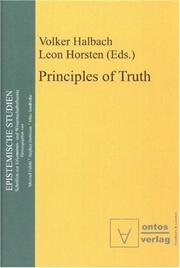
ISBN: 3110332663 9783110332667 9783937202457 3937202455 3110332485 9783110332483 3937202455 9783110332483 Year: 2004 Publisher: Frankfurt : Ontos Verlag,
Abstract | Keywords | Export | Availability | Bookmark
 Loading...
Loading...Choose an application
- Reference Manager
- EndNote
- RefWorks (Direct export to RefWorks)
On the one hand, the concept of truth is a major research subject in analytic philosophy. On the other hand, mathematical logicians have developed sophisticated logical theories of truth and the paradoxes. Recent developments in logical theories of the semantical paradoxes are highly relevant for philosophical research on the notion of truth. And conversely, philosophical guidance is necessary for the development of logical theories of truth and the paradoxes. From this perspective, this volume intends to reflect and promote deeper interaction and collaboration between philosophers and logicians investigating the concept of truth than has existed so far. Aside from an extended introductory overview of recent work in the theory of truth, the volume consists of articles by leading philosophers and logicians on subjects and debates that are situated on the interface between logical and philosophical theories of truth. The volume is intended for graduate students in philosophy and in logic who want an introduction to contemporary research in this area, as well as for professional philosophers and logicians
Truth. --- Logic, Symbolic and mathematical. --- Algebra of logic --- Logic, Universal --- Mathematical logic --- Symbolic and mathematical logic --- Symbolic logic --- Mathematics --- Algebra, Abstract --- Metamathematics --- Set theory --- Syllogism --- Conviction --- Belief and doubt --- Philosophy --- Skepticism --- Certainty --- Necessity (Philosophy) --- Pragmatism
| Listing 1 - 10 of 101 | << page >> |
Sort by
|

 Search
Search Feedback
Feedback About UniCat
About UniCat  Help
Help News
News